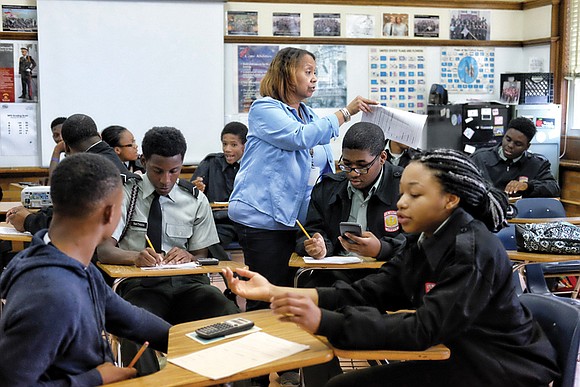Franklin Military Academy financial literacy course receives high marks
6/24/2017, 1:47 p.m.

By Holly Rodriguez
The passionate discussion of Phyllis Jackson’s students can be heard long before reaching her classroom at Richmond’s Franklin Military Academy.
On a recent warm afternoon, Ms. Jackson’s students are divided into small groups to tackle an assignment in her economics and personal finance class: To figure out the cost of transportation to and from work and budgeting the money to cover it.
While every Virginia public high school student must take such a course to graduate, Ms. Jackson’s class received national recognition.
It was named one of the 2017 “100 Best w!se High Schools Teaching Personal Finance.”
Richmond Community High School was the only other public school in Richmond recognized by w!se, which stands for Working in Support of Education, a New York City-based educational nonprofit that honors schools of excellence participating in the financial literacy certification program.
The purpose of the Franklin Military Academy class is to equip students with basic financial literacy skills, such as balancing a checkbook, working within a budget and how to save money.
On this particular day, students are applying some of these skills to real-life scenarios. Ms. Jackson heads to the board at the front of the room and performs calculations showing the cost of gas every week to get to and from work. Using herself as an example, she calculates the mileage from her home to Franklin and the cost of gas per gallon to get the result for her total monthly gas expense.
“Now this doesn’t include money to go to the mall or go pick up your friends,” she said. “This is just to and from work only.”
Her cost: About $100 per month.
In another exercise, she gives each group scenarios that will impact their finances. The students must determine how they would respond.
Among the scenarios: Your mother is sick and you have to take two weeks off from work to help her, meaning you will have no income. What do you do?
You get a 5 percent raise. What do you do with the extra money?
“We put a great emphasis on preparing our kids for reality,” said Sheron Carter-Gunter, the school’s principal.
“One of the things we see as an obstacle to success is being able to navigate the world of finance and accumulate wealth. It is important to us here that (students) have the skills necessary to do those things.”
While the group assigned the loss in pay scenario determined they would cut extraneous expenses to meet their financial obligations for the month, the students with the unexpected pay raise had mixed responses. Some students said they would put the money in savings, while others said they would use the money to purchase something they wanted, such as clothing.
Ms. Jackson used the opportunity to share with students the cost of purchasing a cell phone and maintaining month-to-month service.
“Your parents won’t be paying that bill forever,” she said with a laugh.
Ms. Carter-Gunter said that beyond this class, teachers and administrators at the school want every one of Franklin Military Academy’s 385 students in sixth through 12th grades to have additional skills that will increase their likelihood of post-high school success.
“When they walk out of these doors, we want them to be prepared,” she said.
The school offers technical courses for industry certifications in fields such as HVAC systems and graphic design. The school also provides an advanced diploma track to academically prepare students for college. It also offers Armed Services Vocational Aptitude Battery training to prepare students for entering the various branches of military service.
“The higher the student scores, the more opportunity for different military jobs,” Ms. Carter-Gunter said.






